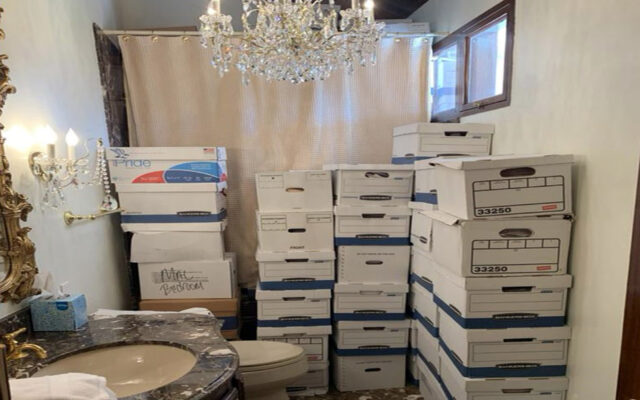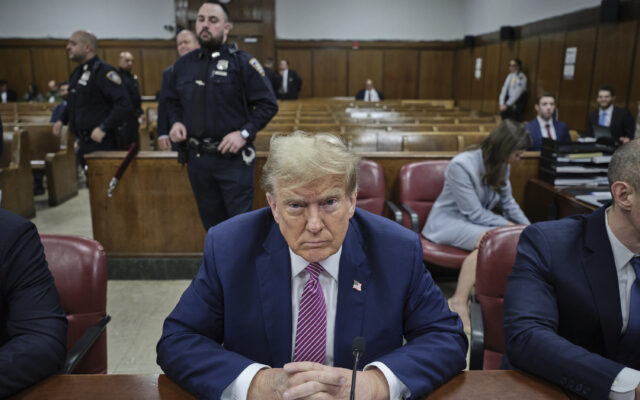Judge Rejects Bid By Former President Trump To Throw Out Classified Documents Case On Constitutional Grounds

FORT PIERCE, Fla. (AP) — A federal judge on Thursday rejected a bid by Donald Trump to throw out out his classified documents criminal case, and appeared skeptical during hours of arguments of a separate effort to scuttle the prosecution ahead of trial.
U.S. District Judge Aileen Cannon issued a two-page order saying that though the Trump team had raised “various arguments warranting serious consideration,” a dismissal of charges was not merited.
Cannon, who was nominated to the bench by Trump, had made clear during more than three-and-a-half hours of arguments that she was reluctant to dismiss one of the four criminal cases against the 2024 presumptive Republican presidential nominee. She said at one point that it would be “quite an extraordinary” step to strike down an Espionage Act statute that underpins the bulk of the felony counts against Trump but that his lawyers contend is unconstitutionally vague.
As Trump looked on in the courtroom, his attorneys pressed Cannon to throw out the case, arguing he was legally entitled to keep the sensitive records he is charged with illegally retaining after he left the White House.
His lawyers say the Presidential Records Act gave him the authority to designate as personal property the records he took with him to his Mar-a-Lago estate in Florida. Prosecutors countered that those records were clearly presidential, not personal, and included top-secret information and documents related to nuclear programs and the military capabilities of the U.S. and foreign countries.
Cannon’s ruling covered only the Espionage Act arguments. A separate motion argued Thursday about whether Trump was entitled under the Presidential Records Act to retain the documents remains pending, but the judge also seemed disinclined to throw out the case on those grounds too.
“It’s difficult to see how this gets you to the dismissal of an indictment,” she told a Trump lawyer at one point.
The hearing was the second this month in the case in Florida, which has unfolded slowly in the courts since prosecutors first brought charges last June. Cannon heard arguments on March 1 on when to schedule a trial date, but has yet to announce one and gave no indication Thursday on when she might do so. Prosecutors have pressed the judge to set a date for this summer. Trump’s lawyers are hoping to put it off until after the election.
After the hearing, Trump on his Truth Social platform took note of the “big crowds” outside the courthouse, which included supporters with flags and signs who honked their car horns in solidarity with the ex-president. He again said the prosecution is a “witch hunt” inspired by President Joe Biden.
Some of Thursday’s arguments centered on the 1978 statute known as the Presidential Records Act. The law requires presidential documents to be turned over to the National Archives and Records Administration, though former presidents may retain notes and papers created for purely personal reasons.
Trump’s lawyers contend that he was free under that law to to do with the records as he pleased.
“He had original classification authority,” said defense lawyer Todd Blanche. “He had the authority to do whatever he thought was appropriate with his records.”
But prosecutor David Harbach told Cannon that there are “all sorts of reasons” that that argument is wrong. Prosecutors believe the files Trump is charged with possessing are presidential records, not personal ones, and that the statute was never meant to permit presidents to retain classified and top-secret documents, like those kept at Mar-a-Lago.
“The documents charged in the indictment are not personal records, period. They are not,” Harbach said. “They are nowhere close to it under the definition of the Presidential Records Act.”
Trump’s lawyers also challenged as overly vague a statute that makes it a crime to have unauthorized retention of national defense information, a charge that forms the basis of 32 of the 40 felony counts against Trump in the case.
Defense lawyer Emil Bove said ambiguity in the statute permits what he called “selective” enforcement by the Justice Department, leading to Trump being charged but enabling others to avoid prosecution. Bove suggested a recent report by special counsel Robert Hur that criticized President Joe Biden’s handling of classified information did not recommend charges proved his point about the lack of clarity.
When a law is unclear, Bove told Cannon, “The court’s obligation is to strike the statute and say ‘Congress, get it right.’”
Jay Bratt, another prosecutor with Smith’s team, disputed that there was anything unclear about the law, and Cannon pointedly noted that striking down a statute would be “quite an extraordinary step.”
Trump is accused of intentionally holding onto some of the nation’s most sensitive documents at Mar-a-Lago — only returning a fraction of them upon demand by the National Archives. Prosecutors say he urged his lawyer to hide records and to lie to the FBI by saying he no longer was in possession of them and enlisted staff to delete surveillance footage that would show boxes of documents being moved around the property.
Cannon has suggested in the past that she sees Trump’s status as a former president as distinguishing him from others who have held onto classified records.
After the Trump team sued the Justice Department in 2022 to get his records back, Cannon appointed a special master to conduct an independent review of the documents taken during the FBI’s Mar-a-Lago search. That appointment was later overturned by a federal appeals court.
On Thursday, she wrestled with the unprecedented nature of the case, noted that no former president had ever faced criminal jeopardy for mishandling classified information.
But, Bratt responded, “there was never a situation remotely similar to this one.”
Trump is separately charged in a federal case in Washington with conspiring to overturn the results of the 2020 presidential election. Trump has argued in both federal cases that presidential immunity protects him from prosecution, though Cannon has not agreed to hear arguments on that claim in the documents case.
The U.S Supreme Court is scheduled to hear arguments on Trump’s immunity claim in the election interference case next month.



